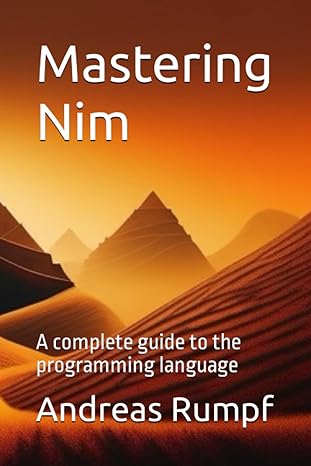Nim Programming Language (original) (raw)
Efficient, expressive, elegant
Nim is a statically typed compiled systems programming language. It combines successful concepts from mature languages like Python, Ada and Modula.
Efficient
- Nim generates native dependency-free executables, not dependent on a virtual machine, which are small and allow easy redistribution.
- The Nim compiler and the generated executables support all major platforms like Windows, Linux, BSD and macOS.
- Nim's memory management is deterministic and customizable with destructors and move semantics, inspired by C++ and Rust. It is well-suited for embedded, hard-realtime systems.
- Modern concepts like zero-overhead iterators and compile-time evaluation of user-defined functions, in combination with the preference of value-based datatypes allocated on the stack, lead to extremely performant code.
- Support for various backends: it compiles to C, C++ or JavaScript so that Nim can be used for all backend and frontend needs.
Expressive
- Nim is self-contained: the compiler and the standard library are implemented in Nim.
- Nim has a powerful macro system which allows direct manipulation of the AST, offering nearly unlimited opportunities.
Elegant
- Macros cannot change Nim's syntax because there is no need for it — the syntax is flexible enough.
- Modern type system with local type inference, tuples, generics and sum types.
- Statements are grouped by indentation but can span multiple lines.
```` ``` import std/strformat
type Person = object name: string age: Natural # Ensures the age is positive
let people = [ Person(name: "John", age: 45), Person(name: "Kate", age: 30) ]
for person in people:
Type-safe string interpolation,
evaluated at compile time.
echo(fmt"{person.name} is {person.age} years old")
Thanks to Nim's 'iterator' and 'yield' constructs,
iterators are as easy to write as ordinary
functions. They are compiled to inline loops.
iterator oddNumbers[Idx, T](a: array[Idx, T]): T = for x in a: if x mod 2 == 1: yield x
for odd in oddNumbers([3, 6, 9, 12, 15, 18]): echo odd
Use Nim's macro system to transform a dense
data-centric description of x86 instructions
into lookup tables that are used by
assemblers and JITs.
import macros, strutils
macro toLookupTable(data: static[string]): untyped = result = newTree(nnkBracket) for w in data.split(';'): result.add newLit(w)
const data = "mov;btc;cli;xor" opcodes = toLookupTable(data)
for o in opcodes: echo o
```` ````
var conditional = 42
if conditional < 0: echo "conditional < 0" elif conditional > 0: echo "conditional > 0" else: echo "conditional == 0"
var ternary = if conditional == 42: true else: false
var another = if conditional == 0: "zero" elif conditional mod 2 == 0: "even" else: "odd"
Case switch.
var letter = 'c'
case letter of 'a': echo "letter is 'a'" of 'b', 'c': echo "letter is 'b' or 'c'" of 'd'..'h': echo "letter is between 'd' and 'h'" else: echo "letter is another character"
```` ````
import std/math
Basic math.
assert 1 + 2 == 3 # Sum assert 4 - 1 == 3 # Subtraction assert 2 * 2 == 4 # Multiplication assert 4 / 2 == 2.0 # Division assert 4 div 2 == 2 # Integer Division assert 2 ^ 3 == 8 # Power assert 4 mod 2 == 0 # Modulo assert (2 xor 4) == 6 # XOR assert (4 shr 2) == 1 # Shift Right assert PI * 2 == TAU # PI and TAU assert sqrt(4.0) == 2.0 # Square Root assert round(3.5) == 4.0 # Round assert isPowerOfTwo(16) # Powers of Two assert floor(2.9) == 2.0 # Floor assert ceil(2.9) == 3.0 # Ceil assert cos(TAU) == 1.0 # Cosine assert gcd(12, 8) == 4 # Greatest common divisor assert trunc(1.75) == 1.0 # Truncate assert floorMod(8, 3) == 2 # Floor Modulo assert floorDiv(8, 3) == 2 # Floor Division assert hypot(4.0, 3.0) == 5.0 # Hypotenuse assert gamma(4.0) == 6.0 # Gamma function assert radToDeg(TAU) == 360.0 # Radians to Degrees assert clamp(1.4, 0.0 .. 1.0) == 1.0 # Clamp assert almostEqual(PI, 3.14159265358979) assert euclDiv(-13, -3) == 5 # Euclidean Division assert euclMod(-13, 3) == 2 # Euclidean Modulo
```` ````
import std/[strutils, strscans]
assert "con" & "cat" == "concat" assert " a ".strip == "a" assert "42".parseInt == 42 assert "3.14".parseFloat == 3.14 assert "0x666".parseHexInt == 1638 assert "TrUe".parseBool == true assert "0o777".parseOctInt == 511 assert "a".repeat(9) == "aaaaaaaaa" assert "abc".startsWith("ab") assert "abc".endsWith("bc") assert ["a", "b", "c"].join == "abc" assert "abcd".find("c") == 2 assert "a x a y a z".count("a") == 3 assert "A__B__C".normalize == "abc" assert "a,b".split(",") == @["a", "b"] assert "a".center(5) == " a " assert "a".indent(4) == " a" assert " a".unindent(4) == "a"
for word in tokenize("This is an example"): echo word
let (ok, year, month, day) = scanTuple("1000-01-01", "$i-$i-$i") if ok: assert year == 1000 assert month == 1 assert day == 1
```` ````
import std/[sugar, tables, sets, sequtils, strutils]
let variable0 = collect(newSeq): for item in @[-9, 1, 42, 0, -1, 9]: item * 2
assert variable0 == @[-18, 2, 84, 0, -2, 18]
let variable1 = collect(initTable): for key, value in @[0, 5, 9]: {key: value div 2}
assert variable1 == {0: 0, 1: 2, 2: 4}.toTable
let variable2 = collect(initHashSet): for item in @[-9, 1, 42, 0, -1, 9]: {item + item}
assert variable2 == [2, 18, 84, 0, -18, -2].toHashSet
assert toSeq(1..15).mapIt( if it mod 15 == 0: "FizzBuzz" elif it mod 5 == 0: "Buzz" elif it mod 3 == 0: "Fizz" else: $it ).join(" ").strip == "1 2 Fizz 4 Buzz Fizz 7 8 Fizz Buzz 11 Fizz 13 14 FizzBuzz"
Recent articles
22 April 2025
Nim versions 2.2.4 and 2.0.16 released
The Nim Team is happy to announce two releases:
- version 2.2.4, a second patch release for the latest stable version
- version 2.0.16, an eight patch release for Nim 2.0
05 February 2025
Nim version 2.2.2 released
The Nim Team is happy to announce version 2.2.2, the first patch release for our stable release, Nim 2.2.

 Support Nim
Support Nim